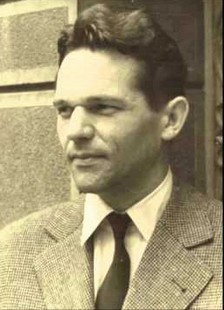
Vasilije Mokranjac (1923–1984, Serbia) held degrees in piano (E. Hajek, 1948) and composition (S. Rajičić, 1951) from the Academy of Music in Belgrade. He taught at Josif Marinković (1948–52) and Mokranjac School of Music (1952–56). He was a professor of composition at the Academy of Music in Belgrade (1956–84) and a full member of the Serbian Academy of Sciences and Arts.
He began his creative work in composition by relying on classical foundations, but from the very beginning he viewed them with a romanticist sensibility, oriented toward themes of relating the individual to the collective principle, with a Beethovenian profile of symphonic thinking involving strongly pronounced dramatic conflicts, which came to the fore especially in his BA graduation piece, Dramatična uvertira (Dramatic Overture, 1950), as well as in early piano pieces and Sonata for Violin and Piano. Similar features are visible in his first three symphonies as well (1961, 1965, and 1967), Divertimento for strings, and Sinfonietta for strings, which he wrote already as a mature composer, expressing an increasingly clear affinity toward using sharpened means of expression (elements of dodecaphony and polytonality). A more modern sensibility is audible already in his early Fragments and Dances for the piano, reflected in his use of bitonality, neobaroque principles of cyclic construction, Scriabin’s mode, Bartókian lively movement, and reflections of jazz.
Mokranjac’s continued creative evolution may be traced in his works from the 1970s: Lirska poema (Lyrical Poem), Fourth and Fifth Symphonies, Koncertantna muzika (Musica concertante) for piano and orchestra, while the philosophic-conceptual circle of his strivings at the time was most clearly summed up in his piano work Odjeci (Echoes), by near consensus the most peculiar piano opus in all of Serbian music. In his final works, Poema (Poem) for piano, the cycle Preludijumi (Preludes) also for piano and the Prelude for solo clarinet, the composer offered a sort of recapitulation of his creative journey, once more confirming the creative act as one of intense confrontation with tradition, context, one’s own commotion and drama.
Intime (Intimacies), a piano suite (1973), was written during Mokranjac’s mature creative period, the same year as his best-known piano work – the suite Odjeci (Echoes). This poem-suite in eight linked movements begins with music of an improvisatory character, like a prelude, based on the theme Voda zvira. The following three movements evoke Debussy. The excitement and ecstatic culmination of the second movement are calmed down in the third, leading to a definite restoration of serenity in the fourth. In the opening section of the fifth movement, the motive from the preceding movement, now forming the accompaniment in the bass, is alternated several times with a yearnful descending motive, which is followed by an even more profound change: by means of mighty chordal blocks and harsh rhythmic accents, the piece, thus far mostly lyrical in character, acquires a dramatic aspect, which, by the end, becomes tragic. In the sixth movement, one almost hears an echo from the past, due to its atmosphere similar to the monophony of Byzantian chant. In the final two movement, following a reminiscence of the obsessive energetic section from the fifth movement, this work, spanning a huge sonic and emotive range, at first intimate, meditative, and optimistic, grows into a terrifying drama. The musical idea presented in the final few bars of Intime is enigmatic, as was, for that matter, the personality of the composer himself.


